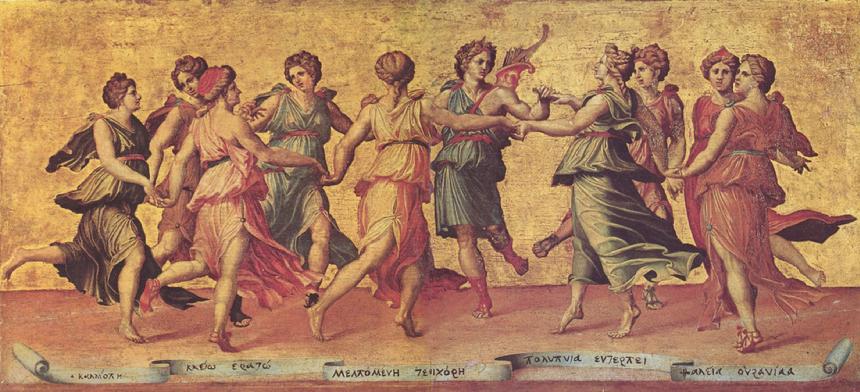 |
| The Nine Muses by Giulio Romano |
|
|
"They are all of one mind, their hearts are set upon song, and their spirit is free from care," he wrote of the Muses. " He (she) is happy whom the Muses love. For though man (woman) has sorrow and grief in his soul, when the Muses sing, at once he forgets his dark thoughts and remembers not his troubles. Such is the holy gift of the Muses." ~ Hesiod
|
|
The Muses In Myth
According to myth, after the gods of Olympus defeated the Titans, they asked Zeus (king of the gods) to create a group of new divinities whose task would be to sing the praises of that great victory. After Zeus coupled with Mnemosyne ("memory") for nine consecutive nights, the muses were born at Pieria, at the foot of Mt.Olympus. Besides being divine singers, each of the nine muses had a different talent and was presented with a symbol.
The Nine Muses are:
Calliope (Beautiful Voice) – Muse of Epic Poetry. (Mother of Orpheus)
Euterpe (Delight) – Muse of Lyric Poetry and Music.
Erato (eros (love) Lovely One) – Muse of Love Poetry and Minicry.
Thalia (thallein (to bloom), Festivity) – Muse of Comedy
Clio (kleos(glory) / kleiein (to celebrate) / Celebration/Fame) – Muse of History and Libraries
Urania (ouranos (sky) Heavenly One) – Muse of Astronomy
Terpsichore (Delight of dancing/choruses) – Muse of Dance
Melpomene (melpein (to sing) the Singing goddess) – Muse of Tragedy.
Polyhymnia (poly (many) and hymnos (hymn) or mnasthai (to remember) Many Songed/Hymned) – Muse of Sacred Poetry. (considered also as inventor of the lyre)
|
|
(Click on the images below for an enlarged view and for more information on each of the Nine Muses)
|
|
Recommended Reading Materials on the Muses
|
|